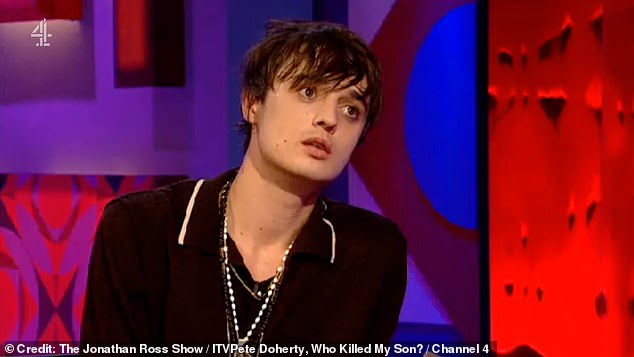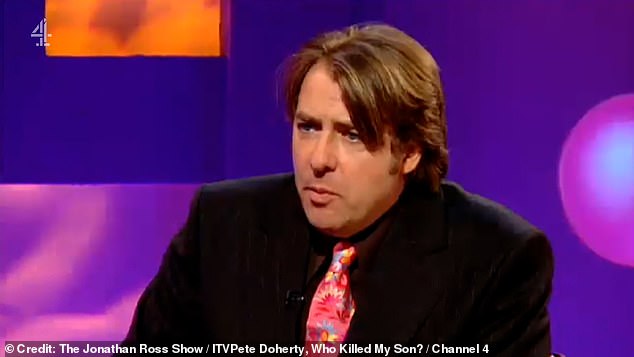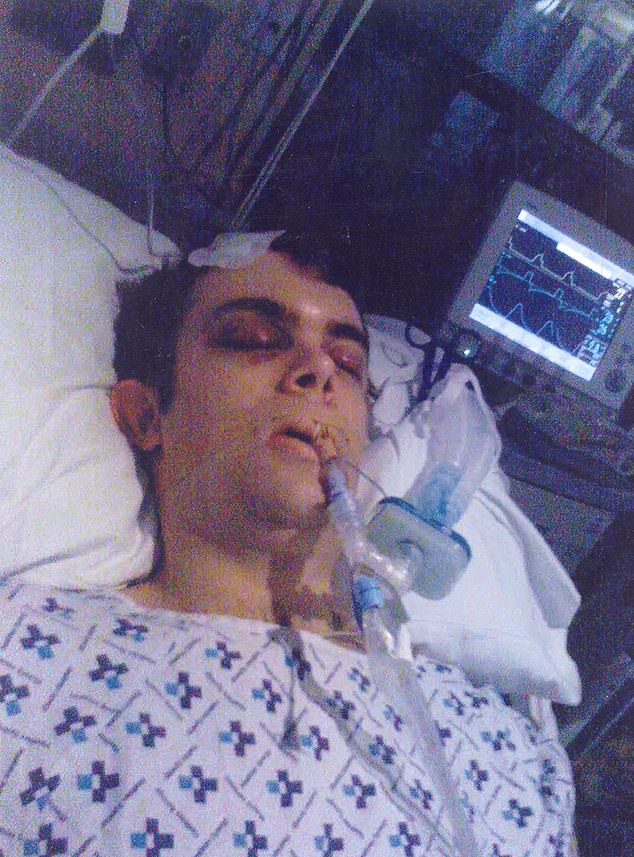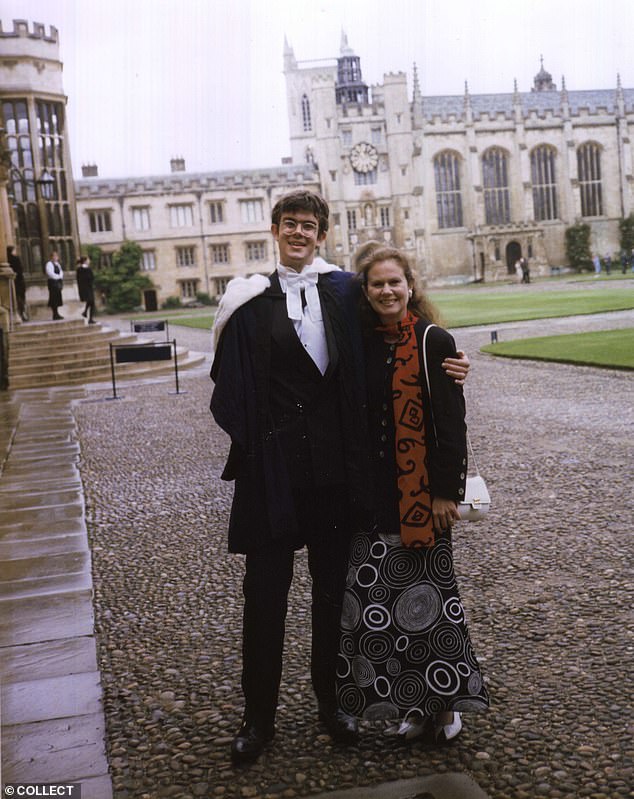‘Well I am innocent’: Pete Doherty’s awkward interview with Jonathan Ross after house party ‘murder’ of Cambridge graduate resurfaces in new Channel 4 documentary
An awkward Pete Doherty interview in which he insists to Jonathan Ross that he is ‘innocent’ has emerged in a documentary about the death of a Cambridge graduate at a party he attended.
Footage of a bizarre encounter was shown on television as part of a new Channel 4 documentary about the ‘murder’ of Mark Blanco, who died after a house party attended by The Libertines singer.
Appearing on Friday Night With Jonathan Ross to promote his new work for the band Babyshambles, the controversial singer appeared to joke about his run-ins with the law.
It came after 30-year-old Mark suffered fatal head injuries after allegedly being thrown from a first-floor flat at a party hosted by Doherty’s friend and fellow drug-addicted officer Paul Roundhill in 2006.
His mother Sheila Blanco has campaigned for justice and for a new documentary ‘Pete Doherty, Who Killed My Son?’ which details the mysterious goings on that night, was released yesterday.
Peter Doherty told Jonathan Ross he was ‘innocent’ when speaking about his run-ins with police during an interview more than a decade ago

The clip resurfaced as part of a documentary about the death of Mark Blanco, who suffered fatal head injuries after attending a party attended by Doherty

In the clip of his interview with Jonathan Ross, Doherty appeared to joke about his previous arrests
As part of the programme, the documentary makers interviewed Sheila, fellow partygoer Naomi Stark and an FBI expert who said he believes Mark was deliberately thrown to death.
Doherty was at the party with his entourage, including his ‘minder’ Jonathan Jeannevol, known locally as ‘Johnny Headlock’, who later confessed to killing Mark before retracting his statement. To date, no one has been charged in his death.
In the show, documentary filmmakers played an interview segment in which Doherty appeared to downplay his numerous arrests and run-ins with the law.
After walking onstage and sitting on the red couch across from the host, Ross praises his guest, saying, “What’s charming about some of your work so far is that there’s a kind of innocence to it.”
However, the conversation turns awkward when Doherty responds by saying “fine” and stares back at the interviewer, prompting laughter from the audience.
He then says “well, I’m innocent,” before turning to the crowd and shrugging.
He added: “I’m fighting a losing battle. Second to third to fourth last, fifth to last time I got nicked,” prompting Ross to joke “that was quite a lot of numbers to get through.”
Undeterred, Doherty said: “The police officer actually had a badge that said ‘Pete Doherty is innocent’.”
When asked if the officer made him sign it afterwards, Doherty shook his head, before revealing that he had been asked to sign things by police in the past.
He dropped his head on the couch to pretend he was being arrested by the police and said, “I’ve been talked to like that before (and they’ve asked) ‘Pete, you won’t mind afterward if you sign something for my son? “‘

Mark Blanco was left with non-survivable head injuries after reportedly being thrown from a first-floor balcony

Pictured: Mark Blanco, actor, with his mother Sheila, on graduation day in June 1997
The clip was shown on the program which followed Mark’s still heartbroken mother, Sheila Blanco, in her quest to find out what really happened to her son the night he died.
Less than a minute after Mark entered the building for the second time – after briefly leaving – he was found unconscious under a first-floor balcony.
CCTV footage then showed Doherty fleeing the scene with another friend, 19-year-old Kate Russell-Pavier, and Jeannevol, callously waving Mark’s body goodbye.
The trio took a taxi to a local hotel, where Doherty trashed his room.
Two years after Mark’s death, and following an initially failed police investigation, a senior detective brought in to re-examine the case admitted that the Met had ruled out an accidental fall or suicide – the latter initially ruled by police put forward as the most likely. cause of Mark’s death.
Leaving aside the unlikely possibility of what the officer called “an intentional jump not intended to cause harm,” all that remains is criminal offense on the part of others who were present that evening.
Two years after Mark’s death, and following an initially failed police investigation, a senior detective brought in to re-examine the case admitted that the Met had ruled out an accidental fall or suicide – the latter initially ruled by police put forward as the most likely. cause of Mark’s death.
Leaving aside the unlikely possibility of what the officer called “an intentional jump not intended to cause harm,” all that remains is criminal offense on the part of others who were present that evening.
Sheila, like many others, has always been convinced that Mark was pushed off the balcony.
The program includes new testimonials from partygoer Naomi Stirk, who recalls seeing Paul Roundhill and Jeannevol physically escort Mark out of the flat in a ‘sinister’ atmosphere.
“From where I was sitting you could see down the hallway and into the kitchen, and there’s a point where I can’t figure out where everyone is,” she says. “I don’t know what happened, but I know something terrible happened.”
Both developments, Sheila believes, should prompt the American police (who never formally closed their investigation) to re-interview the witnesses present.
“I’ve always believed that everyone who was in that apartment that night knows what happened,” she says. Dignified and composed, Sheila is a piano teacher and teacher of English to foreign students, now in her seventies.
In 2007, within six months of Mark’s death, Doherty released a single, Lost Art Of Murder, with his group Babyshambles. He boldly shot a promotional video for it in Roundhill’s flat.
Last year he published his autobiography, A Likely Lad, with a chapter on Mark’s death that Sheila says is ‘full of inaccuracies’ and in which he claims he fled the scene to protect himself and his teenage girlfriend.
He denied knowing how Mark’s body ended up on the ground.
In a statement to the documentary makers, the Met said: ‘Our condolences remain with the family of Mark Blanco following his death in Whitechapel in 2006.
‘Police conducted an investigation into all available evidence… This investigation concluded that there was no evidence that the death was suspicious – a decision supported by the pathologist.
‘Following an inquest concluded in October 2007, an open verdict was handed down.’
As well as expert analysis of the CCTV footage taken, the statement added: ‘Mr Blanco’s death has been subject to various reviews by the Met; where areas for re-investigation were highlighted, these were pursued by homicide detectives.
“The investigation into the death of Mark Blanco remains ongoing and any new evidence or information will be reviewed by detectives.
“We will notify Mr. Blanco’s family of any significant developments in this case.”
In a series of conversations, Roundhill said his sympathies were with Sheila. “Mark was my good friend… I wouldn’t protect anyone who played a role in his death,” he said. “Mark and his family deserve justice.”
Doherty told the programme: ‘I am sorry for the loss of Mrs Blanco and I welcome any help people can give her to help her come to terms with what has happened.’
